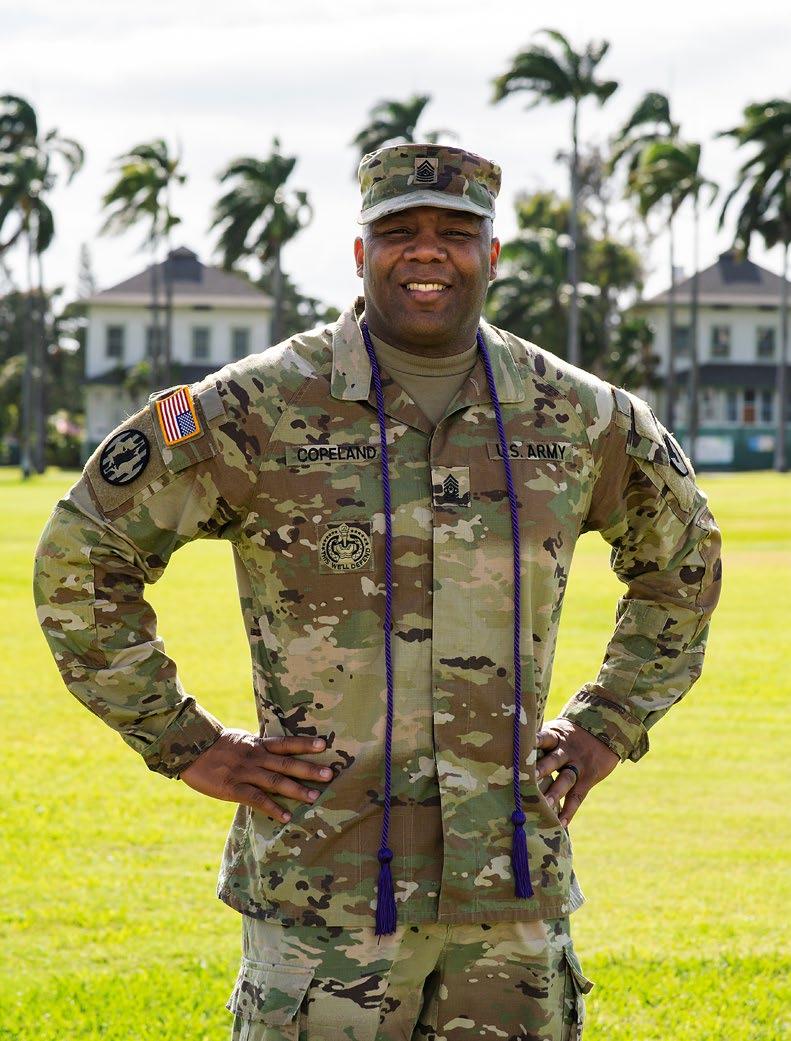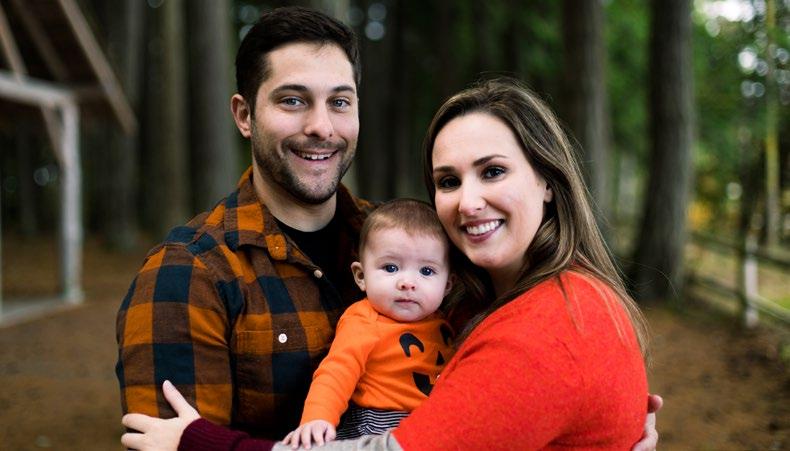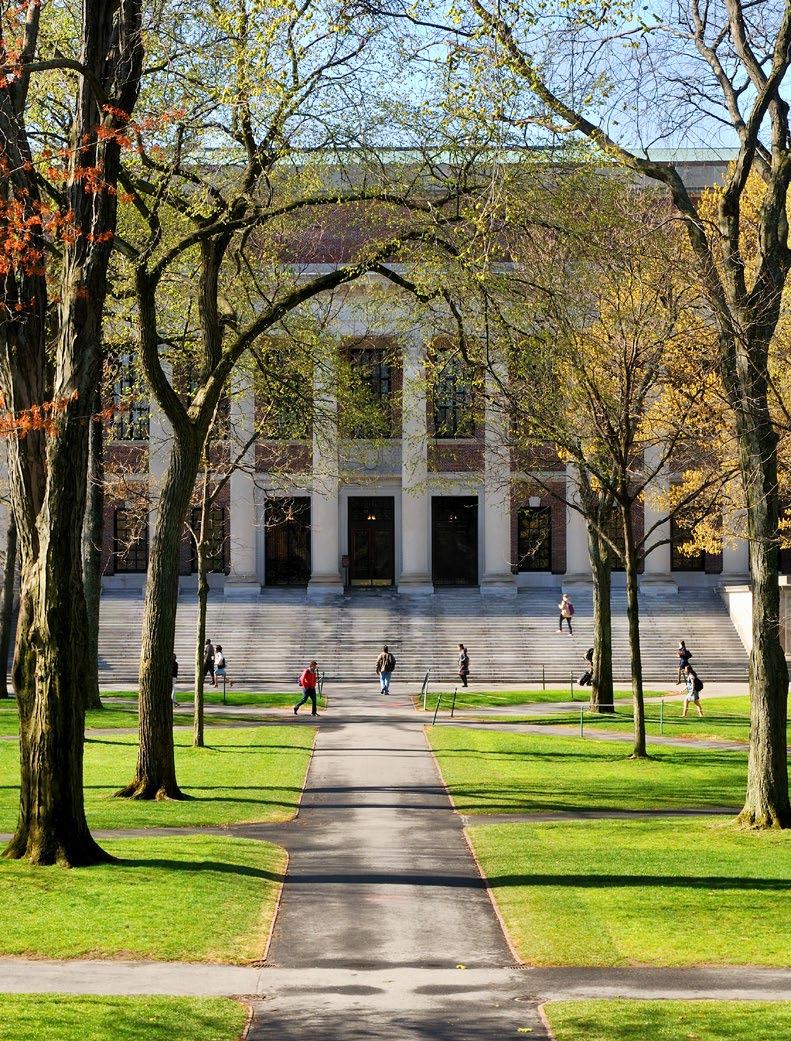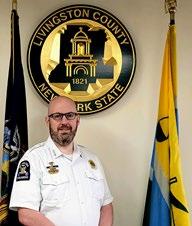EXCELSIOR COLLEGE HELPS SERVICE MEMBERS LEAVE NO CREDIT BEHIND


NAVIGATING STUDENT LOAN FORGIVENESS
30+ SCHOLARSHIPS TO APPLY FOR
PRESENTED BY AMERIFORCE MEDIA
EDITOR’S NOTE

Do you have an education goal in mind for 2022? Or, are you already enrolled in a program? If the answer is “yes” to either question, this guide is designed with you in mind.
Education means different things to different people. Some picture traditional classrooms, desks and lectures by professors at brickand-mortar institutions. Others, like those Army veteran Allison Churchill spoke with on pages 14-15, are choosing nontraditional opportunities that the VA provides funding for.
Then there are service members like Army Command Sgt. Maj. Jason Copeland, a Hawaiibased soldier who is featured on this guide’s cover. His journey with education spans decades and various locations. Thanks to the support and flexibility provided by Excelsior College, Copeland earned his bachelor’s degree — 19 years after promising his mother he would. His story is an inspiring example of how education enhances the skills already being learned and applied during an activeduty career.
Funding an education can be a barrier to success, which is why we highlight many of the resources offered to students with a military
affiliation. This guide includes an article by Air Force spouse Crystal Kupper on cost-saving options like CLEP that allow eligible students to “test out” of a course (page 10), and pages 17-19 outline our annual list of scholarships — with some deadlines on the horizon.
Readers also learn on page 6 how a DOD program for military spouses helps those married to service members build career success.
We hope these stories, tools and resources assist you in whatever schooling you embark on. And no matter what, know that we’re rooting for you.

To your success!
 TEAL YOST, NAVY SPOUSE Associate Editor
TEAL YOST, NAVY SPOUSE Associate Editor

2 | ameriforcemedia.com
Contributors


ALLISON CHURCHILL is an Army public affairs veteran who has also written for the Mineral Daily NewsTribune, Scholastic’s math magazines, Business Insider, and Guideposts. She received her bachelor’s from West Virginia University and master’s from New York University. Allison was a press operations volunteer at the 2016 Olympic Games in Rio de Janeiro, Brazil. She is the first person who comes to mind when her friends discover new products that sparkle.
CRYSTAL KUPPER is a writer, photographer, runner, mom of (at least) four, and Air Force wife currently stationed in Arizona. There's nowhere she'd rather be than outside with her family or chatting about orphan justice.




KRISTEN DE DEYN KIRK is a coastal Virginia, award-winning freelance writer with 25 years’ experience. Born an Army brat (and grateful her dad made it back from his Vietnam tour in time for her birth), she now lives vicariously through her military friends’ adventures, observing the challenges and opportunities they face serving their country. Learn more about Kristen’s work covering business, healthcare, education and technology – and see a picture of her cute dog –online.
TRAVIS HORNSBY, CFA is a speaker and the founder of Student Loan Planner, which he launched after helping his physician wife navigate ridiculously complex student loan repayment decisions. To date, Student Loan Planner has consulted on over $1 billion in student debt. Travis is a chartered financial analyst. He’s been featured in U.S. News, Business Insider, Forbes, Huffington Post, Rolling Stone, ChooseFi, Bigger Pockets, Afford Anything, Money, and more.
ERIC ZEDALIS is a sergeant in the Army Reserve with more than four years of service as a mass communication specialist with the 214th Mobile Public Affairs Detachment. Prior to enlisting, he worked for 10 years in college athletic media relations, including a seven-year stint as assistant director of athletics for marketing & communications at the University of the District of Columbia. His current civilian job is in the field of Army Acquisition as a contractor for Chenega IT Enterprise Services.
WILL MARTIN is an award-winning writer with more than 20 years of journalism and public affairs experience. An Iraq War veteran, he served in the Army National Guard and Air Force Reserve for 21 years before retiring in 2019. His writing passions include military and veteran issues, sports, and social justice. Find him on Twitter at @wmartin89 and his writing at www.goodwillwriting.org. Connect with him on Twitter and read his works at Good Will Writing.


2022 MILITARY EDUCATION GUIDE | 3
BY KRISTEN DE DEYN KIRK
BY CRYSTAL KUPPER
5 tips to successfully turn military service into college credit National Guard expanding on ‘generous’ state education benefits

 BY ERIC ZEDALIS Scholarship directory for military-connected students
BY WILL MARTIN
BY ERIC ZEDALIS Scholarship directory for military-connected students
BY WILL MARTIN
4 | ameriforcemedia.com Contents 2022 MILITARY EDUCATION GUIDE 08 10 17 12 22 Excelsior College helps service members leave no credit behind
BY BIANCA M. STRZALKOWSKI Best practices for testing out of college courses
11 YEARS 10 YEARS
MASTER SGT. TIMOTHY LEAKS
Master Sgt. Timothy Leaks used his military training and transferred in three-quarters of the credit needed for his bachelor’s degree, allowing him to graduate within one year.
YOUR NEXT BIG STEP— YOUR DEGREE
“I found Excelsior catered tremendously to military. Just my training and experience, that was 47 credits by itself.”

MAXIMUM CREDIT FOR MILITARY TRAINING

CAREER-FOCUSED PROGRAMS AND CERTIFICATES 50+ YEARS OF EXPERIENCE

ONLINE | ACCREDITED | NOT-FOR-PROFIT Paid Ad. No Federal Endorsement of Advertiser Intended.
DOD scholarship helps military spouses increase employability, earnings
BY MELISSA M. STEWART
When Navy spouse Rebecca Turlo decided she wanted to switch careers, she needed a way to boost her resume. Though she already had a bachelor’s in marketing, she knew additional education would help her break into the human resources field.

“I wanted to do something I love,” she explained. “I always wanted to be in recruiting, but no one would hire me because I’ve never had a recruiter title.”
After some research and networking, Turlo discovered what she called the perfect self-paced recruiting certificate program, offered through the Milspo Academy. A career coach from the academy, which aims to help military spouses obtain highdemand careers that fit the military lifestyle, gave her an overview of the training process and suggested she apply for a My Career Advancement Account Scholarship (MyCAA) for tuition assistance.
Turlo received approval within three days and secured the funds she needed to pay for the program with a MyCAA Scholarship, a very big factor in her choice to get further education, she said.
“MyCAA is targeted toward our younger spouses and is a great way for them to get started on or continue their education,” said
Maj. Charlie Dietz, public affairs officer for the office of the Secretary of Defense. “Higher levels of education, training and professional development can lead to increased employability and earnings.”
MyCAA is a DOD-sponsored workforce development program that provides up to $4,000 in financial assistance to eligible military spouses to use for a license, certification or associate degree. Dietz said eligibility is based on the pay grade of the service member and whether they are on Title 10 orders. He recommended that every spouse contact the SECO Career Center to determine eligibility.
“Recognizing that the MyCAA program does have eligibility constraints, we encourage all eligible military spouses to take advantage of the program while they are eligible,” said Dietz. “There are so many education programs out there that are part of the MyCAA program. Our career coaches and advisors can help spouses find a program that meets their specific needs.”
While military spouses use MyCAA for a variety of programs, Dietz said the majority of them seek healthcare-related education and training.
“Healthcare is very broad, and we see spouses pursuing programs such as nursing, dental, pharmaceuticals and healthcare administration,” he said. “Business administration and information technology are also very popular programs.”
After Turlo completed her eight-week recruiting program with the help of MyCAA, she landed a position as a technical sourcing specialist for Randstad Sourceright, where she recruits for Google. She said she now loves her work again in a remote role that provides the flexibility she needs with a 1-year-old son and frequent PCS moves.
“I know a lot of military spouses, and we want to be home with our young children,” she said. “And we need the ability to go anywhere. I highly recommend this program for someone who wants a really great career that can be remote.”
For more info on MyCAA, to check your eligibility or start the application process, visit https:// mycaa.militaryonesource.mil/mycaa/get-started.
6 | ameriforcemedia.com CAREERS
The Turlo family. Courtesy photo




Subscribe now for complimentary copies. Receive free magazines at your installation, organization, company or housing office.

“I was born and mostly raised in Virginia, but I was an Air Force brat, and I graduated from high school in Texas. Because of that, they charged me out-of-state tuition,” he said.
Prior to his sophomore year, Copeland learned about the Army’s delayed entry program. A recruiter said: Take out a student loan. Attend basic training in the summer at Fort McClellan, Alabama. Return to Virginia, finish a second year of college and then enlist. His promise of $5,000 prompted Copeland’s “yes.” The sign on bonus would pay off his loan.
Then, life happened, which included moving with the military, deploying and raising children. Over the course of the next few years, Copeland completed more classes.
“I was at the point where the lack of a degree would affect me moving forward,” Copeland said. “The Army was shifting into a place where you needed not only technical expertise, but also the educational aspect.”

He reflected: Why, as a military police soldier looking to advance, was he studying political science and business and taking classes occasionally? Why not criminal justice and a degree?
Copeland later landed at the Sergeants Major Academy. The nudging feeling grew.
“I met the highest rank that you can go as an enlisted member, and I still hadn’t finished my degree or changed majors,” he said.
He pictured the people around him – his children and younger soldiers looking for a role model, officer counterparts knowing he had expertise and experience, but not the education.
Excelsior College had a presence at Copeland’s post. Friends who worked as education advisors suggested he check them out.
He learned that switching majors was a possibility, and the college accepted transfer credits while awarding credits for military experience. A degree – in about a year and a half with ultimately 14 courses covered by the Army’s tuition assistance – was within his reach.
“If you are in the military, a veteran or a family member, our intention is that you speak with somebody who speaks the same language,” Chris Johnson, director
of military and veteran academic advising at Excelsior College, said, “somebody who understands different funding sources, whether it’s tuition assistance or VA benefits, and transfer credits.”
The staff’s informal motto: Leave no credit behind.
Copeland chose criminal justice, and his learning went beyond books.
“I was in discussion panels with professors and other industry leaders,” Copeland said. “I was talking to them about community policing and how you run multiple police stations. It all taught me a lot about how to manage and be a leader.”
As for the juggle of work, school and family, he explained it was easier than he thought it would be.
“The professors were always there to answer questions, whether you reached out via email, text or pigeon carrier. When travel was coming up, they gave me permission to work ahead on assignments,” he said.
In fact, Excelsior College staff is fueled by a ‘whatever it takes’ mentality.
As an example, Amy DeSpirito, assistant director of military and veteran advising, shared how she worked with a student who had post-traumatic stress disorder. He struggled, was dismissed, then submitted an appeal to give it another chance.
“We created a plan,” DeSpirito said. “He sought therapy, and I followed up with him. It was a matter of making sure he had everything he needed as far as support and guidance. He’s doing a lot better. I keep
following up. I checked on his grades recently, and he got an A. It’s hard for veterans sometimes, especially later in life, to come back to school. It made me really proud that he put the work in. He’s proud, too.”
Since completing a bachelor’s at Excelsior College, Copeland has earned a master’s in leadership studies and two graduate certificates in executive and highperformance leadership at other schools. He’s working on a doctorate in public policy with a concentration in global leadership. His family of five grew to six, and he’s currently geobaching at Fort Shafter, Hawaii. He’s responsible for installation management at four locations from Alaska to Japan.
“It’s similar to being a governor. My director and I manage the staff and resources,” Copeland explained. “Whether it be personnel, fire departments, police departments, we oversee it all, to the tune of about $16 billion a year.”
In the coming months, he’s heading back to Texas and heading up an installation there.
“You’re talking about a young kid from Portsmouth, Virginia that was an Air Force brat,” Copeland said, “making it to the highest position that you can possibly reach in installation management. That’s pretty humbling. I went from walking into an education center on an installation to being in charge of an installation.”
Excelsior College has supported more than 72,000 military graduates. To learn more about how you can have a successful degree path, visit https://www.excelsior.edu/militaryand-veterans.
2022 MILITARY EDUCATION GUIDE | 9
Best practices for testing out of college courses
 BY CRYSTAL KUPPER
BY CRYSTAL KUPPER
A fully-funded program by the U.S. government helps eligible militaryaffiliated students save thousands of dollars on school costs.
The average cost of a three-credit college course is roughly $1,170, according to the Education Data Initiative, with other financial factors tacking on hundreds of additional dollars in cost depending on state residency and student loan interest. However, students have the option of “testing out” of approved courses through the College-Level Examination Program (CLEP) — a program offering 34 exams that cover introductory level college course material for 2,900 U.S. colleges and universities.
Since 1974, the Department of Defense has provided CLEP funding for service members through DANTES. According to Emily Paulsen, executive director at the program that runs CLEP, about 40,000 military members take advantage of the program annually.
“[T]he original purpose of our partnership has remained unchanged: helping servicemembers save time and money, and accelerate their path to a college degree,” Paulsen stated in an email response.
To be successful at the exam process, Paulsen offered up the following best practices:
Use your life experience
Paulsen said most CLEP-takers choose a subject they know well. “A student who already speaks Spanish may take Spanish, a student who has developed management
skills through work or military training may take Principles of Management and a student who enjoyed US History in high school may opt for US History I or II,” she explained.
2 Utilize the preparatory information
CLEP’s website offers free content overviews and sample questions. DANTES-funded testtakers receive free e-guides when registering for a CLEP. A company called Modern States, meanwhile, uses college faculty to teach ondemand CLEP courses, and all textbooks and course materials are free.
3 Register at a test center (including on-base) or for remote proctoring
“Students who plan to test using remote proctoring (as opposed to a physical testing center) should also be sure to check the technology and environment requirements in advance of test day to make sure they have everything they’ll need,” Paulsen recommended.
4 Take care of yourself
Get a good night’s sleep, eat well and visualize yourself passing the CLEP on test day. Think like an athlete!
5 Give yourself some grace
If you fail, Paulsen said, it’s not the end of the world. “While they may not receive
Who is eligible for CLEP?
Military personnel (active duty, reserve, National Guard): Army, Navy, Marine Corps, U.S. Coast Guard, Army Reserve, Air Force Reserve, Marine Corps Reserve, Navy Reserve, Coast Guard Reserve, Army and Air National Guard.
Spouses of: Coast Guard (active and reserve).
Civilian employees of: Air Force (must test at on-base or U.S. fully funded test centers).
Veterans: If you're a veteran, you may be eligible to receive education benefits under the Forever G.I. Bill.
college credit for their score, it also will not impact their GPA or overall educational journey,” she pointed out. “Additionally, these students have the option of retesting after three months and can also take exams in other subjects in the meantime.” Modern States will cover the retest fee for students who complete one of their online courses, too (DANTES only covers the first test fee). Visit
10 | ameriforcemedia.com CLEP
https://clep.collegeboard.org/clepmilitary-benefits to learn more about utilizing CLEP for your education. 1
HOW TO USE A TUTOR VIRTUALLY
BY CRYSTAL KUPPER
that’s not how it’s designed to operate! So come with your thinking cap.
Ninety-six percent of those surveyed after utilizing the service received better grades and increased confidence in their academic pursuits. And the program is offered at no cost to eligible service members, civilian personnel and their dependents.
Since 2010, approximately 3 million military members and their dependents have done exactly that through Tutor.com, one of the oldest and most prestigious virtual tutoring services. Besides access to 3,000 highlyqualified tutors, a top benefit of using Tutor.com as a military-connected student is that it is completely free.
Read on for tips from Pamela Brehm, Tutor.com’s senior director of military & government programs, on how to successfully work with a tutor virtually:
1 Get familiar with the platform — Tutor.com is far more than just emailing a professor. It’s an entire virtual classroom designed for any sort of academic problem you may have, so explore. Brehm
said that students can utilize the text-chat or two-way voice chat, an interactive whiteboard, text and coding screens, drawing tools, graphing calculator and file sharing.
2 Come with your assignment ready — you can either type the assignment into the chat box or directly upload it once your session starts. “If you are ready with the necessary materials, your tutor will be able to clarify quickly how to help you, and you can get started together right away,” Brehm wrote in an email.
3 Make sure to pick the right subject — sometimes academic challenges cover more than one area of expertise. Your chances of getting help quickly and without annoyance rise when you choose the right sort of tutor from the get-go.
4 Be ready to work — Brehm said that sometimes students use Tutor.com with hopes that the tutor will simply solve the problem for them. But
5 Be confident — “You can figure out whatever you’re stuck on, and tutors are dedicated to helping you,” Brehm said. “Rest assured: It’s OK not to know the answers or even where to get started. That’s why you are connecting with a tutor!”

6 Remember that there is a pot for every lid … and a tutor for every student — If you don’t click with a certain tutor, there are plenty of others. Tutor.com’s platform allows you to select someone else who might better fit your learning style.
7 Think outside the clock — Given its constant accessibility and consistency, consider not only using Tutor.com for yourself, but also sharing with your dependents (including military children) to ease military-related transition stress. “Military families also report that having access to Tutor.com offers them a consistency that may be otherwise unavailable when their educations may be interrupted due to deployments and moves,” Brehm said.
To sign up for a Tutor.com account, visit https://military.tutor.com/home.
2022 MILITARY EDUCATION GUIDE | 11 TUTOR.COM
The majority of students who used virtual tutors reported improved performance in schoolwork, according to Tutor.com’s website.
TURN MILITARY SERVICE INTO
to successfully 5 TIPS COLLEGE CREDIT
 BY ERIC ZEDALIS
BY ERIC ZEDALIS
The steps are clear for service members, including guardsmen and reservists, who want to turn military service into college credit, according to Michele Spires, assistant vice president of ACE Learning Evaluations at the American Council on Education (ACE).
“It’s important that guardsmen and reservists take three steps that I like to call DEL – Determine – Evaluate –Learn,” Spires said.
12 | ameriforcemedia.com
THE EXPERT
ASK
According to Spires, who has 30 years of experience in post-traditional and workforce education, DEL means it’s essential for guardsmen and reservists to:
1. Determine their long and shortterm goals;
2. Evaluate their military transcript and other academic and professional credentials; and
3. Learn transfer of credit protocols at the institution(s), and for the programs, they wish to attend.
“Once the personal and/or professional decision is made to attend a college or university, it’s best to start the process right away,” Spires said. “It’s unfortunate when a student wastes valuable time and money taking classes that are unnecessary duplications of previous courses because they signed up before their credentials were completely evaluated.”
ACE Learning Evaluations has been validating military-connected learning since 1954 through a contract with the Department of Defense that’s managed by the Defense Activity for Non-Traditional Support (DANTES).
This work aligns academic credit recommendations (in the form of semesterhour credits) for courses and occupations, and then documents them on the Joint Services Transcript (JST) or the ACE Working Transcript.
Spires said the actual process of turning military service to align with college credit can start with a conversation with a college or university advisor to review the service member’s digital credentials (the ACE Working Transcript and/or JST).
“This is part of credit for prior learning (CPL), and it’s really important for each individual to think about how the learning they’ve obtained can support the admissions process, pre-requisite requirements, or be used as transfer credit to meet course equivalents,” she said.
Spires, who is actively engaged in the national discussion on evaluating educational experiences that occur outside the traditional classroom, said there are several factors that affect CPL transfer, such as: institutional policy, alignment with appropriate courses, procedures, requirements, and transfer application deadlines.
Planning and preparedness are key to success for guardsmen and reservists, Spires said. So how does she recommend they do this?
Research, identify and compare academic institutions that meet their individual needs.
“This could include location, cost, programs, scheduling, accreditation, learning environment, community services and graduation rates,” she said. “They may also include institutions and academic programs that have policies to maximize their CPL (military credit, etc.).”
Learn and understand those academic institutions’ policies and procedures regarding transfer of credit.
“These practices are established by each institution and will vary,” Spires said.
Periodically audit and review their credentials, such as military transcripts, for updates and modifications.
“Learning is continuous,” she said, “and managing those learning records for accuracy mitigates errors and confusion during the official process.”
Initiate the transcript and transfer review process early, even with their application to the institution.
“Have all official transcripts from previous colleges and service branches sent for evaluation as quickly as possible,” Spires said. “Official copies must be securely transferred electronically or bear the appropriate institutional signatures, seal, and date of issuance.”
Engage with the academic advisor.
“He or she should be able to help guardsmen/reservists avoid taking classes for which they may receive transfer credit until an official evaluation is completed,” she said.
More than 2,300 colleges and universities accept ACE credit recommendations, according to Spires, which ensures guardsmen and reservists can find the right institution to fit their goals.
“Credit for prior learning will help save time, reduce costs, aid in career planning, and lead to more options,” Spires said. “Student success is the top priority for colleges and universities, but strong communication at the outset between the institution and the guardsmen/reservist is an important part of building that success.”
To that end, Spires recommends guardsmen and reservists consider their degree plan goals and identify potential academic courses for transfer from their learning experiences.
“For example, they can compare credit recommendations to their institution’s course catalog or syllabus by reading the learning outcomes and topics documented on the ACE exhibit provided in the ACE National Guide and/or Military Guide,” she said.
Also important, according to Spires, is taking ownership during the process and following up with the advisor, registrar, or admissions department.
“Most importantly, guardsmen [and] reservists should monitor their curriculum plan, transfer approvals, and documentation within formal university systems,” she said. “This ensures there’s an appropriate alignment of credit and the right classes are being completed, in the proper sequence, for the program plan and pathway.”
2022 MILITARY EDUCATION GUIDE | 13
“Credit for prior learning will help save time, reduce costs, aid in career planning, and lead to more options.”
3 VETERANS WHO USED
GI BILL BENEFITS TO PURSUE

NON-TRADITIONAL EDUCATION
BY ALLISON CHURCHILL
Education benefits are a powerful tool for military recruiters. But sitting in a traditional classroom doesn’t appeal to every veteran. In fact, the Department of Veterans Affairs reports 15% of veterans chose vocational, technical, or nondegree programs.
A variety of options and interests
John Francis Bragoli, who served as a Marine from 2008 to 2012, pursued a few career fields. Before enlisting, he did auto body work; while serving as a mortarman, he discovered a knack for cutting his buddies’ hair, giving trims every Sunday while deployed. When he returned to Long Island, New York, after his service, he initially went back to auto body work. Wanting to broaden his skillset, he went to Lincoln Tech’s Queens campus to study automotive technology.
“It’s hard to learn when you’re working,” Bragoli said. “Especially when you have bills and stuff and want your free time.”
The housing allowance provided by the Post-9/11 GI Bill made it so he could focus on school.
After his 2018 graduation from Lincoln Tech, Bragoli had a year of formal barber training at the Beauty & Barber Institute of New York on Long Island, graduating in 2019. Having discovered a love of learning, he then enrolled in the computer technician networking specialist program at Hunter Business School. He found a job in that field after graduating in 2021 and enjoyed it. But just a month in, the Metropolitan Transportation Authority called about a test he took in 2017 and offered him a track worker position. Bragoli said he plans to stay in that job until retirement.
Cooking shows to culinary school
Kristina Houston served in the Army for nearly 25 years before retiring as a sergeant first class in 2016. During a 2015 deployment to Pakistan, she applied to the Culinary Institute of America’s San Antonio, Texas, campus. She was ready to leave
behind information technology and the pressure to keep up with certifications and new products.
“I’ve always loved cooking and cooking shows,” Houston said. “I wanted to do something I like to do.”
Houston was ready to start classes in January 2017, but her mom was diagnosed with cancer.
“That put everything on the back burner,” she said.
She took her mom, who has now been cancer-free for four years, to treatment and worked at the post office until she began culinary school the following January.
Cooking shows didn’t fully prepare Houston for everything they covered in
14 | ameriforcemedia.com
TRADE CAREERS
the 18-month program — things like identifying different cuts of meat and how to separate them or the process of preparing seafood for cooking. Her internship at a country club taught her the importance of timing in meal preparation, and volunteering at school events allowed her to rub elbows with celebrity chefs.


After graduating, Houston moved to Texarkana to be with her now-husband; shortly after, COVID-19 caused many restaurants to close or reduce staff. For now, Houston incorporates what she learned into her home cooking but would like to open a café or bistro, something with a “comfortable, homey setting,” she said.
Remaining on the front lines
Sam Tinelli spent five years as a hull maintenance technician in the Navy, separating in 2006 as a petty officer second class. He didn’t know what he wanted to do before joining but got into firefighting during his service and decided to continue when he returned to New York. Tinelli became a volunteer firefighter but found out he needed to take a test and be a certified emergency medical technician to be appointed to the professional fire academy.
He took the firefighter exam and fell in love with working as an EMT. A community college owns the county’s public safety training facility, so Tinelli was able to use his Montgomery GI Bill benefits. After two years as an EMT, he returned to the school to take the paramedic course.

Today, Tinelli is the chief paramedic for Livingston County EMS. He has served as a flight medic and is working on a bachelor’s in emergency management service, taking advantage of a program providing free tuition to veterans at State University of New York campuses. And he makes a point of hiring veterans – so far, they make up one-tenth of his force, with every branch except the Space Force represented.
“When I was younger, my attention span was on the rough side,” he said.
Bottom line: Utilize your benefits
The best advice these veterans had to offer was to not let education benefits go to waste: Don’t let them expire, and think about what you want before you enroll. Even if a classroom setting isn’t for you, the possibilities are endless.
2022 MILITARY EDUCATION GUIDE | 15
Tinelli also credits age with making him a better student.
Visit the Department of Veterans Affairs to learn more about VA education benefits.
Kristina Houston
Sam Tinelli
STUDENT CHECKLIST
For service members/ veterans
What’s your end goal: certification, license, degree?
What time commitment do you have for a course load? Do you want to attend in person or online?
Speak with the installation education center to determine the best program for your goals and schedule.
Research schools including accreditation, student reviews, and its standing with the DOD [See list of institutions with a DOD MOU].
Examine financial aid options such as the FAFSA, tuition assistance, scholarships, and GI Bill benefits.
After gathering the above information, apply to the program that fits your goals, budget, and way you want to attend.
Design a course schedule with the whole semester in mind. For example, if you will be deploying with limited internet, a full course load might not be the best option. Create a designated space for homework and studying or find a remote location like the base library or a local coffee shop.
Review syllabi ahead of the semester, documenting due dates and materials needed. Connect with support groups, like Student Veterans of America. Need extra help? Check out Tutor.com’s free program for military students.
For military spouses
What’s your end goal: certification, license, degree?
What time commitment do you have for a course load?
Do you want to attend in person or online?
Speak with a MySECO counselor to determine the best education program for your goals.
Research schools including accreditation, student reviews, and its standing with the DOD.
Apply for the FAFSA.
Evaluate additional financial aid options, including MyCAA, scholarships, and grants [See page 17-19].
After gathering the above information, apply to the program that fits your goals, budget, and way you want to attend.
Design a course schedule with the whole semester in mind. For example, do you have an upcoming PCS move, shift change at work, or childcare limitations?
Create a designated space for study time.
Review syllabi ahead of the semester, documenting due dates and materials needed.
Need extra help? Check out Tutor.com’s free program for military students.
16 | ameriforcemedia.com
SCHOLARSHIP DIRECTORY

FOR MILITARY-CONNECTED STUDENTS
BY BIANCA M. STRZALKOWSKI
2022 MILITARY EDUCATION GUIDE | 17
RESOURCES
Completing an education is hard enough without having to stress about how to pay for it. If you have a military affiliation and are thinking about college (or are already working on a degree), you’re in luck. Organizations have stepped up to offer education assistance to offset the cost of tuition and fees.
Yes, that’s right. There are programs — scholarships, loans, and grants — designed with you in mind. But it’s going to take some work and a lot of organization. Please note: If no deadline is indicated, it means the application period for 2022 has ended and you should check back during the same timeframe in 2023.
A few things to consider ahead of time:
1. Read all of the criteria early so that you can plan for any time-consuming requirements, like letters of recommendation.
2. Create reminders for deadlines so that you don’t miss any important dates.
YEAR-ROUND SCHOLARSHIPS
National Military Family Association
What’s the basics: Awards available for all levels of degrees, professional licenses and certifications, supervised clinical hours, and business expenses.
Application details: Year-round.
MyCAA (My Career Advancement Account)
Who’s eligible: Spouses of service members with the rank of E1-E5; W1-W2; O1-O2.
What’s the basics: Maximum tuition assistance benefit of $4000 to be used toward an associate degree, license or certification.
Application details: Year-round.
BRANCH AID SOCIETIES
Navy-Marine Corps Relief Society
Who’s eligible: Spouses of active duty or retired sailors and Marines.
What’s the basics: Interest-free loans and grants for undergraduates at an accredited 2- or 4-year education, technical or vocational institution.
Application details: Deadline to apply is June 3, 2022.
Air Force Aid Society
Who’s eligible: Spouses of active-duty airmen and Title 10 reservists, and widows; dependent children of active duty, Title 10 reservists on extended active duty, Title 32 Guard performing full-time active duty, retired, retired reserve and deceased Air Force or Space Force members.
What’s the basics: Needs-based grant ranging from $500 – $4000.
Application details: Applications will be available January 2023.
Army Emergency Relief (for military spouses)
What’s the basics: The Mrs. Patty Shinseki Spouse Scholarship Program is a need-based scholarship program established to assist Army spouses in obtaining an undergraduate degree or similar professional certification.
Application details: Opens June 1, 2022.
Army Emergency Relief (for military kids)
What’s the basics: The Maj. Gen. James Ursano Scholarship Program is a needbased scholarship program established to assist children of Army Soldiers in obtaining their first undergraduate degree.
Application details: The application cycle typically runs January - April.
Coast Guard Mutual Assistance
Who’s eligible: Spouses of Coast Guardsmen.
What’s the basics: Loans and grants for a number of reimbursable educationrelated expenses.
Application details: Year-round.
PRIVATE ORGANIZATIONS
Pat Tillman Foundation
Who’s eligible: Current spouses of veterans or active-duty service members, including surviving spouses.
What’s the basics: $10,000 scholarship to assist with academic expenses, such as tuition, fees, and books.
Application details: Opens February 2023.
Fisher House Foundation
Who’s eligible: College students of active duty, Guard and reserve or retired military commissary customers.
What’s the basics: A total of 500 scholarships are distributed in the amount of $2,000 each.

18 | ameriforcemedia.com
FINRA Foundation Military Spouse Fellowship Program
What’s the basics: The fellowship provides military spouses the opportunity to earn the Accredited Financial Counselor® certification.
ThanksUSA
What’s the basics: Scholarships awarded to spouses and military kids may be used for a first-time undergraduate study at an accredited 2-year or 4-year college, university, or accredited vocational technical or trade school program.

Application details: The application cycle typically runs March 1 – April 15.
Florida Advisory Council on Military Education
Who’s eligible: Active duty, Guard, or reserve service member of the U. S. Armed Forces; Spouse of any active duty, Guard, or reserve service member of the U. S. Armed Forces; and veteran with an honorable discharge (must provide documentation).
Application details: The application cycle typically runs at the beginning of the year until March.
Virginia ACME
Who’s eligible: Active duty, drilling reservists, National Guard members and their dependents; veteran or retiree.
Hope For The Warriors
What’s the basics: Five different categories of scholarships with application cycles in the spring and fall.
Council of College and Military Educators (CCME)
What’s the basics: The organization awards $1000 scholarships with the application process typically running July to November.
Coast Guard Foundation
Who’s eligible: Spouses and children of enlisted Coast Guard members; children of fallen Coast Guard members; and enlisted Coast Guard members.
Application details: The application cycle typically runs February - April.
NATIONAL SPOUSE CLUBS
Navy Wives Clubs of America
Who’s eligible: Up to 31 scholarships awarded annually, with eligibility for spouses/dependents of the Navy, Coast Guard, and Marine Corps.
Application details: The application cycle typically closes at the end of March.
LOCAL SPOUSE CLUBS
There are dozens of spouse clubs co-located to military installations around the world. (Yes, we said world – including OCONUS locations). These organizations are a place of camaraderie for spouses, but also participate in philanthropic activities like scholarships and charitable giving. At the start of each new year, the clubs usually open up applications for scholarship programs with specific eligibility requirements. Some require applicants to be a member and some do not.
How to find them: A simple internet search of your installation and the phrase ‘military spouse club’ should produce results. Also, the club may be officer, enlisted or combined.
TIP: Local spouse clubs typically open applications in December/January.
Below are a few examples of those offering education assistance—
Eielson Air Force Base Spouses’ Club (AK)
Fort Huachuca Community Spouses Club (AZ)
Military Spouses Club of Yuma (AZ)
Military Spouse Association of Camp Pendleton (CA)
Monterey Bay Officers Spouse Club (CA)
Travis Spouses Club (CA)
Fort Meade Spouses’ Club (MD)
Maryland Military & Civilian Spouses’ Club (MD)
Camp Lejeune Officers’ Spouses’ Club (NC)
Association of Bragg Spouses (NC)
Minot AFB Spouses Club (ND)
Offutt Enlisted Spouses Club (NE)
Offutt Officers’ Spouses’ Club (NE)
North Country Spouses Club (NY)
Tinker Spouses’ Club (OK)
Military Spouses of Newport (RI)
Fort Bliss Spouses’ Association (TX)
Fort Hood Military Family Member Scholarship Fund (TX)
Did we miss something? If your organization offers a militaryaffiliated scholarship or grant, email managing.editor@ameriforcemedia.com
2022 MILITARY EDUCATION GUIDE | 19
Navigating the STUDENT LOAN FORGIVENESS PROGRAM
BY TRAVIS HORNSBY, AFC
If you’re a service member or veteran with student loan debt, you need to be aware of some major options to get relief before it potentially expires later this year.

Student loan forgiveness options specifically tailored to veterans are lacking. The programs available to everyone, regardless of their service, are often better than those geared toward service members.
That’s because student loan repayment programs for the military often provide a very limited benefit. In some cases, the benefit even counts as taxable income.
If you’re still on active duty, you should consider whether your branch offers a College Loan Repayment Program benefit. This can provide up to $65,000 toward student loans.
However, I’d like to highlight some additional options you may not be aware of.
Public Service Loan Forgiveness waiver
Through Oct. 31, the Department of Education will count all prior payments and military deferment toward the Public Service Loan Forgiveness (PSLF) program.
To obtain this benefit, you need to consolidate at Federal Student Aid website, and then you need to apply at studentaid. gov/pslf by listing all of your employment history. You will want to get signatures to verify your service.
Veterans with more than 10 years of credit can get all of their loans discharged tax free due to this program.
And if you fall short of the 10 years needed, you can get a considerable additional
amount of credit and possibly work longer in a nonprofit or government job to complete the 10-year requirement.
Income-driven repayment waiver
In April 2022, the Biden administration announced an Income-Driven Repayment waiver (IDR).
This program allows many kinds of forbearances and payments to count toward loan forgiveness programs beyond the PSLF, which is limited to public servants who have served or plan to serve for 10 years full time.
Older borrowers with many years of payments can possibly get their loans forgiven entirely if they have been in repayment for 20 years or more.
VA disability student loan discharge
The government has started matching borrower records with veterans with who
20 | ameriforcemedia.com
STUDENT LOANS
have a 100% disability rating to forgive their student loans.
If you are permanently disabled or have a 100% disability rating, contact your servicer to see if you can qualify for this discharge, as it would be tax-free.
Beware of scams targeting veterans Veterans have long been the target of scams and schemes designed to separate you from your money.
Know that student loan companies will rarely call you. If anyone calls you promising you “Biden student loan forgiveness” or hyping a limited time benefit, beware and contact your servicer.
Sometimes it’s true that there’s a limitedtime benefit, such as with the PSLF waiver above, which expires Oct. 31.
Most companies that reach out to you about student loans want to charge you a four-figure fee to consolidate, which does not provide you with a plan and might not even help you.
When in doubt, contact your servicer and ask if they called you or emailed you. If they didn’t, don’t respond to companies saying they can help you get student loan forgiveness.
Sometimes pay back your loans, but sometimes do not One of the biggest misconceptions about student loan debt is that it’s like any other debt. It is not.

Some advice you might read suggests paying off your balance in full. That might make sense for some people, but it does not make sense if you plan to work for 10 years in public service.
Over 100,000 borrowers have received PSLF in the past year alone, largely due to the extensive waiver of program requirements during the pandemic.
Realize that sometimes you need to pay back your student loans, but other times you will want to make yourself aware of the many different loan forgiveness programs that can help you get your student loans wiped away.
Furthermore, Congress passed the American Rescue Plan, which eliminates all taxes on student loan discharge and forgiveness from now until the end of 2025.
Help to figure out your student loans
While you should start with contacting your servicer about the opportunities listed above, you can also reach out to our team at Student Loan Planner to get professional help from one of our CFP® or
CSLP® professionals.
Veterans deserve more but get left holding the bag when it comes to student loan debt. Do your homework and get help if you think you need it.
2022 MILITARY EDUCATION GUIDE | 21
BENEFITS
NATIONAL GUARD EXPANDING ON STATE EDUCATION BENEFITS ‘GENEROUS’
 BY WILL MARTIN
BY WILL MARTIN
In 1985, Ken Hardy was getting ready to part ways with the Army after three years on active duty. As part of his out-processing, he was required to speak with an education counselor.
“I know you don’t want to stay in the Army, but do you want to go in the Guard?” the counselor asked Hardy. Before he could decline, the counselor added that Hardy’s home state – Massachusetts – covered 100% of college tuition for its National Guardsmen.
“I actually joined the Guard that day,” Hardy said.
Today, Hardy serves as chief of the Army National Guard’s Education Services Branch. State benefits, he said, remain the foundation of National Guard education assistance.
“It’s what separates us from the other
components, for both the Army and Air Guard, really,” Hardy said. “All the other components offer only federal programs.”
Hardy said 39 states offer 100% tuition coverage for National Guard soldiers attending public colleges and universities, and that all states offer at least some education benefits above and beyond the federal assistance that’s available to all service members.
Depending on the state, those benefits can include financial support for soldiers attending private schools or those earning certificates or professional credentials.
“They’re just tremendous programs,” Hardy
said. “But we have a dual mission, too. We’re the only component that regularly gets called up to respond to state disasters and missions. That’s why we offer those programs – to draw the talent and strength necessary for readiness – and we offer our soldiers the benefits that go along with that.”
And Hardy said recent developments have expanded on the already “generous” state education benefits.
This year, a law was passed ensuring National Guard soldiers could use the Montgomery GI Bill-Selected Reserve and federal tuition assistance simultaneously. Because GI Bill money often goes directly to the soldier, Hardy said this development
22 | ameriforcemedia.com
A member of the Louisiana Army National Guard, right, watches as two Louisiana State University-Shreveport students put on harnesses before climbing a rock wall during a recruitment event in October 2008 (DVIDS).
ARMY NATIONAL GUARD
EDUCATION PROGRAMS
State benefits: Used by about 30% of guardsmen (about 100,000 soldiers)
Federal tuition assistance: Used by about 8% of guardsmen (about 25,000 soldiers)
Montgomery GI Bill Selected Reserve Used by about 8% of guardsmen (about 25,000 soldiers
Note: About 63,000 National Guard soldiers and family members are using the Post-9/11 GI Bill, which is available to service members who have served on active duty for significant periods of time.
is critical in ensuring Guard members can cover expenses beyond tuition, such as housing, books and fees.
In addition, some states are now mirroring Post-9/11 GI Bill programs in that they permit Guard members to transfer their education benefits to their spouses and children. And some allow Guard members to carry their education benefits to public institutions across state lines.
The sheer volume of state and federal education benefits available to Guard soldiers can be overwhelming. Hardy said there are online resources, such as the NationalGuard.com education portal and the Army IgnitED website and various state National Guard websites. But even the best sites are limited in their ability to offer personalized guidance, and Army IgnitED has faced usability challenges and is undergoing renovations to correct its shortcomings.
“We always recommend connecting with your state ESO (Education Services Officer),” Hardy said. “You might need a credential, not a college degree, or it might be worth holding off on certain benefits so you can transfer them later to your spouse and your kids. Those are things an education officer can help you navigate specific to your state’s benefits.”

2022 MILITARY EDUCATION GUIDE | 23
Ja’shabrel Miller, a member of the Tennessee Army National Guard, sits at Trevecca University, where she is a graduate student (DVIDS/July 2021).
TOP 3
AmeriForce Media is always accepting submissions for military-related stories. Have an inspiring tale of education success? Share your story here.





 TEAL YOST, NAVY SPOUSE Associate Editor
TEAL YOST, NAVY SPOUSE Associate Editor











 BY ERIC ZEDALIS Scholarship directory for military-connected students
BY WILL MARTIN
BY ERIC ZEDALIS Scholarship directory for military-connected students
BY WILL MARTIN










 BY CRYSTAL KUPPER
BY CRYSTAL KUPPER

 BY ERIC ZEDALIS
BY ERIC ZEDALIS









 BY WILL MARTIN
BY WILL MARTIN

